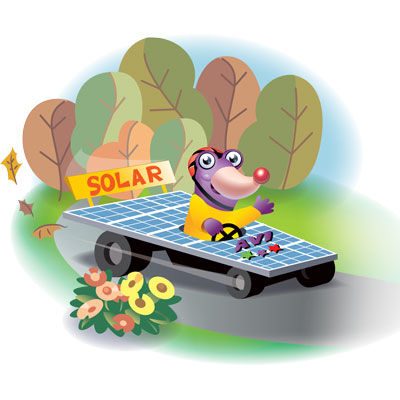By Neal Abrams
What’s the connection between batteries and Earth Week? When we use batteries instead of nonrenewable power sources (like coal, oil, and natural gas), we help protect our planet!
A battery is a container to store chemical energy. When we need it, this energy can be changed into electrical power. Batteries are helping us move away from fuels that pollute to renewable energy sources — like sunlight*, wind, and moving water.
Fossil fuels release energy as they burn. They were formed over millions of years from dead plants and animals buried deep inside the earth. Over time, temperature and pressure changed them into various types of material with stored energy. Right now, burning these fuels is the main way we generate energy to heat our homes, power our cars, and nearly everything else.

Saying no to fossil fuels, and yes to cleaner sources!
There are only limited amounts of fossil fuels left on earth. When we have used them all up, they’ll be gone forever—which is why we call them nonrenewable. Another problem is that they pollute the environment as we burn them for energy.
The good news is that renewable energy sources, like the sun and the wind, will always be around. They are much cleaner than fossil fuels, because when we use them for energy, they don’t pollute the environment as much. But what do we do when the sun isn’t shining, or when the wind isn’t blowing?
The answer is … batteries! When the sun is shining, its energy can charge a battery. Similarly, when the wind is blowing, wind turbines can charge a battery. Batteries can store this energy like a bank stores money. Electricity is “deposited” (or charged) and “withdrawn” (or discharged) from batteries whenever it is needed.
Think of a house with solar panels and a battery system. On sunny days, the solar panels charge the batteries and supply electricity to the house. During cloudy days or at night, the solar panels don’t produce electricity. However, we can switch to the battery with stored energy as the source of electricity for the house. The bigger the battery, the more power it can store. It would be ideal to have a battery system large enough to power a home for several days.
To make the change from using fossil fuels for energy to solar energy (and other cleaner sources), batteries are important. Today, many homeowners cannot afford to have solar panels and a battery backup for using clean energy. This is often because of the high cost for the panels and large batteries needed.
This is why engineers are working on solutions to allow entire neighborhoods, and even cities, to be powered by batteries. Scientists are working on building safer, cheaper, and better batteries for all of us. Would you like to one day own a battery-powered home?
*The sun’s lifetime is so long that its energy will practically never run out.
Neal Abrams is Associate Professor of Chemistry at the SUNY College of Environmental Science and Forestry in Syracuse, New York.

